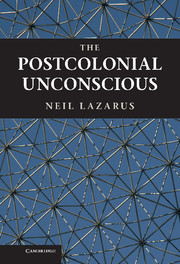Book contents
- Frontmatter
- Contents
- Acknowledgements
- Introduction: The political unconscious of postcolonial studies
- 1 The politics of postcolonial modernism
- 2 Fredric Jameson on ‘Third-World Literature’: a defence
- 3 ‘A figure glimpsed in a rear-view mirror’: the question of representation in ‘postcolonial’ fiction
- 4 Frantz Fanon after the ‘postcolonial prerogative’
- 5 The battle over Edward Said
- Notes
- Works cited
- Index
1 - The politics of postcolonial modernism
Published online by Cambridge University Press: 05 June 2012
- Frontmatter
- Contents
- Acknowledgements
- Introduction: The political unconscious of postcolonial studies
- 1 The politics of postcolonial modernism
- 2 Fredric Jameson on ‘Third-World Literature’: a defence
- 3 ‘A figure glimpsed in a rear-view mirror’: the question of representation in ‘postcolonial’ fiction
- 4 Frantz Fanon after the ‘postcolonial prerogative’
- 5 The battle over Edward Said
- Notes
- Works cited
- Index
Summary
In recent years – since the mid 1990s, say – a more or less concerted materialist critique has arisen of the epistemological and ideological tendencies that have been foremost in postcolonial studies from the time of its initial consolidation as an academic field of enquiry in the elite universities of the anglophone world. While it would clearly be too much to claim that this emergent critique has succeeded in overturning the ruling tenets and protocols of the field, it nevertheless exercises a discernibly widening influence there. The specific assumptions and investments predominant in the field from its inception still predominate today, though not nearly as serenely as formerly. Among these assumptions and investments, I would list in particular the following: a constitutive anti-Marxism; an undifferentiating disavowal of all forms of nationalism and a corresponding exaltation of migrancy, liminality, hybridity, and multiculturality; an hostility towards ‘holistic forms of social explanation’ (towards totality and systemic analysis); an aversion to dialectics; and a refusal of an antagonistic or struggle-based model of politics. Where, some fifteen years ago, Homi K. Bhabha could characterise these investments quite unilaterally and unselfconsciously as representing ‘the postcolonial perspective’ (Location of Culture, p. 173), those speaking for the prevailing positions today tend to look over their shoulders while doing so, hedging their bets and introducing all kinds of qualification into what had previously been a relatively untrammelled discourse.
There is no need to rehearse here the arguments that have been adduced by the materialist critics in postcolonial studies.
- Type
- Chapter
- Information
- The Postcolonial Unconscious , pp. 21 - 88Publisher: Cambridge University PressPrint publication year: 2011
- 2
- Cited by

